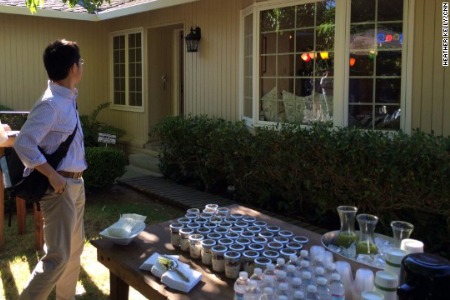
The 15th anniversary was held at the Menlo Park, California, garage where Larry Page and Sergey Brin created Google.
(CNN) — With Google Glass, a new quest to cure death and driverless cars, it can be easy to forget what Google’s primary business is: search.
The largest search engine in the world is getting a few updates, the company announced on Thursday. Google tied the news to its 15th birthday and held the announcement in the original Google Garage.
The overall design has been updated and borrows the “card” look from Google Now, lumping relevant information into rectangles and carousels and placing it above any links to websites.
Answers will now be “richer” and include comparisons, filters and sorting. For example, if you ask Google to compare two foods, it will return a chart of their nutritional values. There are new results for song and music searches, and push notifications will soon come to the Google iOS app.
The company is continuing to focus heavily on voice search, improving its conversational skills on the Web and in search apps.
“We believe that voice will be fundamental to building interactions with future devices that we will see,” said Amit Singhal, Google’s senior vice president of search. Devices such as smartwatches and Google Glass forgo traditional input devices in favor of voice interactions.
No corporate birthday party is complete without a trip down memory lane and balloons and birthday cake, both of which were also present at the event.
In September 1998, Google founders Larry Page and Sergey Brin started their company in Susan Wojcicki’s home garage in Menlo Park. The space remains largely unchanged and still has the same sky blue carpet Wojcicki had installed as a perk to persuade Brin and Page to rent the space.
Wojcicki, now a senior vice president at Google, kicked off the event.
“Even though a lot of thing are different at Google, the core is still the same,” she said, citing the company’s commitment to improving search, being a global company and thinking big.
The original Google was indexing pages on the Internet, returning links to 10 Web pages that had a high probability of containing information that matched a query. The system was imperfect, easily flummoxed by synonyms, misspelled words and sites that gamed the system.
Over the years, Google has launched various changes to the search engine to improve results.
It added spell check, grasped the concept of synonyms and rolled out auto-complete. In 2007, it moved on from just links and started including other types of relevant content such as images, news articles and maps as part of its “universal search.” A subtle update happened in 2010. Google Instant shaved fractions of seconds off each Google search by predicting your search terms as you type them.
“Google gives me back an hour of my life every month,” said Singhal of Google Instant. “That’s not small, that’s huge.”
More recent changes have focused on how Google understands information. The Knowledge Graph debuted in 2012 and connects search terms with real objects, places and people.
Now the company is indexing information. Instead of the top 10 pages about Picasso, you will get information on the painter directly from Google at the top of your search results, including background, images of famous paintings and related artists.
People who use Google might not notice one of the bigger changes. The company has updated its under-the-hood search algorithms to something called “Hummingbird,” which will affect 90% of searches worldwide. The changes will make a difference in how results are ranked.
“Finding relationships between concepts is a very, very hard problem. And you have to balance the meaning of what that query is looking for with what the document is saying,” said Singhal.
